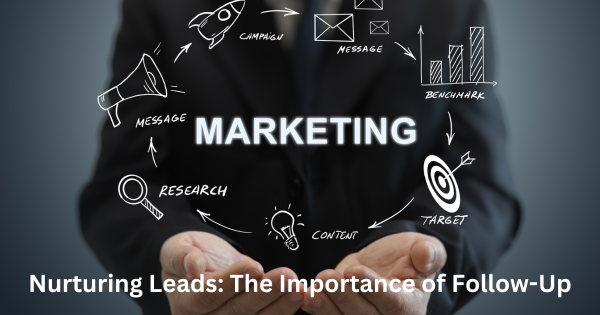Nurturing Leads: The Importance of Follow-Up

Nurturing Leads: The Importance of Follow-Up. In today’s competitive business environment, generating leads is only the first step in a much larger journey. The real challenge lies in transforming those leads into loyal customers, and a crucial factor in this transformation is the follow-up process. While many businesses recognize the importance of initial outreach, they often overlook the power of nurturing leads through consistent and thoughtful follow-up. This blog explores the significance of follow-up, effective strategies to implement, and the long-term benefits of nurturing leads in your sales process.
The Lead Lifecycle Explained
To truly understand the importance of follow-up, we first need to grasp the lead lifecycle. Leads typically move through several stages:
- Awareness: This is when potential customers first learn about your product or service, often through marketing campaigns or word-of-mouth.
- Interest: At this stage, leads express interest by engaging with your content—signing up for newsletters, downloading resources, or visiting your website.
- Consideration: Here, leads begin to weigh their options, comparing your offerings against competitors.
- Intent: Leads demonstrate clear intent to purchase, which might involve putting items in a shopping cart or directly contacting your sales team.
- Purchase: Finally, the lead converts into a paying customer.
However, the journey doesn’t end with a sale. Effective follow-up can turn first-time buyers into repeat customers and enthusiastic advocates for your brand.
The Impact of Follow-Up
Building Strong Relationships
Follow-up is not merely a tactic to close sales; it’s a strategy for building lasting relationships. A well-timed follow-up can show leads that you value them as individuals, rather than just as potential revenue. Personalized communication fosters a deeper connection and demonstrates your commitment to understanding their needs.
Boosting Conversion Rates
Research indicates that most leads require multiple touchpoints before they convert. In fact, studies suggest that it can take five to seven follow-ups to successfully close a sale. Neglecting follow-up means missing out on substantial opportunities. Consistent outreach keeps your brand at the forefront of a lead’s mind, increasing the chances of conversion.
Gathering Valuable Insights
Follow-up interactions offer a prime opportunity to collect feedback and insights from your leads. This information can help you refine your marketing strategies, enhance your offerings, and better address customer concerns. Understanding the perspectives and preferences of your leads can significantly enhance your value proposition.
Follow-up communication serves as an educational tool. Providing relevant resources—such as case studies, articles, or how-to guides—can help leads understand how your product or service meets their specific needs. This nurturing process empowers them to make informed decisions, aligning your solutions with their challenges.

Nurturing Leads: The Importance of Follow-Up
Effective Follow-Up Strategies
Timing Matters
The timing of your follow-up can greatly influence its effectiveness. Studies show that responding to leads within an hour can significantly increase the likelihood of meaningful conversations. Prompt follow-up not only capitalizes on initial interest but also conveys enthusiasm for your product or service.
Personalization is Key
Generic follow-up messages often get lost in the noise. Personalizing your communication can dramatically improve engagement. Address leads by name, reference specific interactions or concerns, and tailor your message to resonate with their unique situation. Personalization fosters a sense of connection and shows that you care.
Multi-Channel Engagement
In an increasingly digital world, engaging leads through multiple channels can enhance your outreach. Whether via email, phone calls, or social media, a multi-channel approach allows you to reach leads in their preferred manner. For example, an initial email can be followed up with a phone call or a social media message, providing multiple touchpoints.
Establishing a Follow-Up Cadence
A structured follow-up cadence can help maintain momentum without overwhelming leads. Consider a timeline that includes:
- Immediate Follow-Up: Acknowledge their initial inquiry within 24 hours.
- Value-Added Follow-Up: Share relevant resources or insights within a week.
- Check-In: Reconnect after a couple of weeks to see if they have further questions.
- Long-Term Nurturing: Continue to engage through newsletters, updates, or special offers.
This structured approach ensures a balance between persistence and patience.
Harnessing Technology
Implementing a Customer Relationship Management (CRM) system can streamline your follow-up process. CRMs help track interactions, schedule follow-ups, and automate reminders, ensuring that no lead falls through the cracks. Marketing automation tools can also assist in delivering targeted content based on lead behavior and interests.
Measuring and Adjusting
To continually improve your follow-up strategies, it’s essential to measure their effectiveness. Track metrics such as open rates, response rates, and conversion rates to evaluate what works. Analyzing this data will help you make informed adjustments to your follow-up approach, ultimately leading to better results.
Long-Term Benefits of Nurturing Leads
Fostering Brand Loyalty
Nurtured leads are more likely to become repeat customers. When you consistently follow up and provide value, you create a positive experience that builds trust. Loyal customers are not only inclined to return for future purchases but also to recommend your brand to others.
Enhancing Brand Reputation
A business that prioritizes follow-up and customer care builds a strong reputation. Satisfied customers are more likely to leave positive reviews and testimonials, enhancing your brand’s credibility. In an era where online reputation matters, effective lead nurturing can significantly bolster your image.
Creating Brand Advocates
When customers feel valued, they are more likely to become advocates for your brand. These advocates not only make repeat purchases but also share their positive experiences within their networks, expanding your reach and generating new leads. Thoughtful follow-up nurtures this advocacy by establishing meaningful connections.
Increasing Customer Lifetime Value
Nurturing leads extends beyond the initial sale. By engaging customers post-purchase through follow-ups, you can encourage repeat business and upsell opportunities. This strategy enhances customer lifetime value (CLV) and contributes to sustained business growth.
Conclusion
In the ever-evolving landscape of sales and marketing, the importance of follow-up is paramount. It’s not just a means to close sales; it’s a vital component of the lead nurturing process that can significantly impact conversion rates, foster relationships, and enhance brand loyalty. By implementing effective follow-up strategies—timely communication, personalized outreach, and leveraging technology—businesses can turn leads into lifelong customers. As you refine your sales processes, remember that nurturing leads through thoughtful follow-up not only drives immediate results but also sets the stage for long-term success. In the end, nurturing is about building meaningful connections that benefit both your customers and your business.








